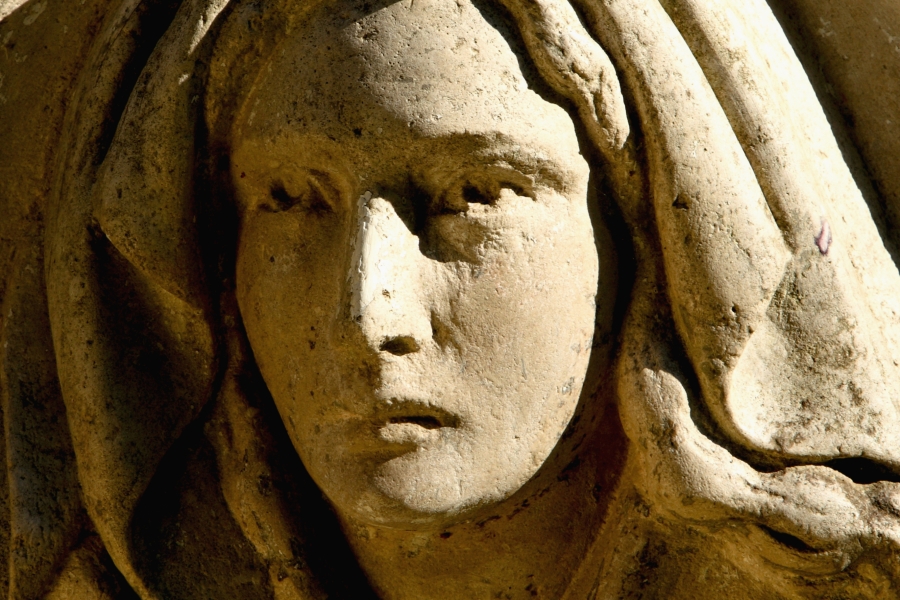“For I am the first and the last.
I am the honoured one and the scorned one.
I am the whore and the holy one.
I am the wife and the virgin...
I am the silence that is incomprehensible...
I am she who cries out,
and I am cast forth upon the face of the earth...”
From The Thunder, Perfect Mind
A poem discovered among the gnostic manuscripts at Nag Hammadi, Egypt in 1945
In our book Riverlution, where we explore the natural spiritual evolution of humanity, the section on womankind discusses the damage done by, “what may be called ‘the war on women’ – that is the widespread and systematic repression of women and all they stood for that has lasted for centuries.” The age-old discrimination against women is a story sadly all too well known. Was it a war? In this article, we will be focusing on womankind’s search for a spiritual voice.
A Spiritual War?
No war was declared, no armies marched and yet women have experienced a sustained campaign against them for millennia, seeking to subjugate them, denying them the opportunities given to men. Nowhere is this more in evidence than in women’s spirituality, which religious authorities have sought to supress. Yet it is also true that this repression has met with resistance, primarily from women themselves but also from male allies.
 Fragment of a Statue of Mary Magdalene
Fragment of a Statue of Mary Magdalene
In the Judaeo-Christian tradition, the story of Adam and Eve is well known. Eve is created out of Adam’s rib; she persuades Adam to eat the forbidden fruit. And so the two time-dishonoured tropes about women are established from the start: women are inferior and wicked. Less well known is that in an earlier part of the book of Genisis, it says:
“So God created mankind in his own image,
in the image of God he created them;
male and female he created them.”
So in the original version there is an implicit equality. What happened? And then we have Lilith, not mentioned in the Bible but well known in Jewish mythology. She was Adam’s first wife, who wouldn’t accept an inferior position. In the medieval text, the Alphabet of ben Sirach, she tells Adam, “We are equal to each other inasmuch as we were both created from the earth.”
The assertion of female spiritual equality can be found in the early Christian movement, some of whose groups not only had women priests and bishops but even spoke of a female divinity. The Church authorities denounced them as heretics and burnt their books. It re-merged in the Middle Ages with the Cathars, when it was ruthlessly suppressed again. In the seventeenth centuries it found expression with the Quakers, who faced discrimination. Only now is it finding some progress within a few of the Churches, though women themselves have found alternative routes to express their spirituality.
Finding my own path – Thérèse’s Experience:
Women’s experiences of spiritual suppression vary the world over. For some it’s a struggle against a patriarchal infrastructure explicitly or implicitly supported by the status quo. For others, non-compliance could result in imprisonment or even death. It is there for all, even today. As for me, I had to find my own spiritual path.
It was a blessing and a curse to have been brought up Catholic. I’m grateful I had a strong spiritual grounding, that God was part of my consciousness from the beginning. I learnt the liturgy through osmosis, the Bible though constant exposure. I prayed (and repented) by rote. It was not until much later that I developed my own way of communicating with the Spirit.
Figures like Jesus’ mother Mary, firebrand Joan of Arc, Saint Bernadette – the peasant girl who experienced apparitions – or my namesake, Saint Thérèse of Lisieux, were some of the few female spiritual role models we could aspire to. These women were exalted. Mary’s goodness and holiness seemed unattainable. Joan, heroically, was burnt at the stake, steadfast in her trust in God to the end. Bernadette and Thérèse, ever humble and obedient, had both died young in a convent. I struggled to relate to what I interpreted as their meekness in the face of “the Lord’s will”. It appeared to me that the only way for women to participate spiritually was to be dutiful and deferential. I felt rebellious and unworthy.
.jpg) Statue of Joan of Arc, New Orleans, Louisiana, USA
Statue of Joan of Arc, New Orleans, Louisiana, USA
I naturally came across nuns growing up, many of whom were genuine, loving people who did much to nurture my attraction to the Spirit. But they were cloistered, and, to my mind, “shackled” to their vows of poverty, chastity and obedience to the hierarchy. None was allowed a voice of significance that I ever heard. How much richer would the religions of many parts of the world be if the spiritual wisdom of women could be included!
I stepped away from the Church at 18 because I could not find myself in it. At that time no one I knew openly questioned its patriarchal structure, dubious history or rumours of abuse. I shied away from the secrecy and authoritarianism. But while I walked away from the form, I didn’t abandon the substance of my spirituality. In my own way, I tried engaging with the parts that resonated with me. Loving one another. Being honest and true. Being open to the spirit. Placing my trust in a higher source.
I groped for spiritual meaning. I explored meditation, vegetarianism, eastern spiritual practices, yoga, but was too restless to fully engage with them. I was rudderless, looking for peace, yearning for a life lived in the flow. With age came a little more clarity. I started to know better who I was. Gradually it dawned on me that my inner voice was my best guide..jpg) I think many people, not only women, have had to find their own way spiritually. It is challenging yet liberating not to be bound by dogma. I had to find my own path, listen to the voice of my Higher Self, entrust myself to the Spirit. It’s an ongoing process but it has allowed more peace and joy to flow into my life. I moved on from the Church itself, but still feel a connection to the spirit of its origin, the universal message of Jesus: “Love one another.” It’s hard to go wrong if you do just that.
I think many people, not only women, have had to find their own way spiritually. It is challenging yet liberating not to be bound by dogma. I had to find my own path, listen to the voice of my Higher Self, entrust myself to the Spirit. It’s an ongoing process but it has allowed more peace and joy to flow into my life. I moved on from the Church itself, but still feel a connection to the spirit of its origin, the universal message of Jesus: “Love one another.” It’s hard to go wrong if you do just that.
By Simenon Honoré and Thérèse Barton
You can read more about Women's Riverlution in our book, Riverlution: Going with the flow of personal and planetary change
The views expressed in this article are not necessarily those of Spirit of the Rainbow as a whole.
Not yet signed up for our newsletter? It only takes a minute, here.
Popular posts
You might also like
Email Newsletter Our latest articles and offers delivered straight to your inbox.
Our latest articles and offers delivered straight to your inbox.